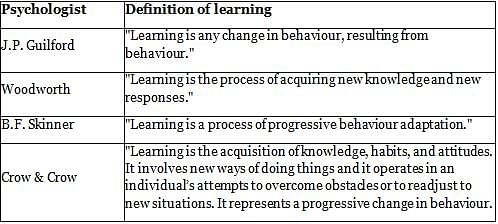Gujarat TET Paper 2: Child Development and Pedagogy Test - 7 (Social Science) - Gujarat TET MCQ
30 Questions MCQ Test - Gujarat TET Paper 2: Child Development and Pedagogy Test - 7 (Social Science)
The conclusion 'Children can learn violent behaviour depicted in movies' may be derived on the basis of the work done by which of the following psychologists?
Which of the following is NOT a characteristic of socially disadvantaged students?
| 1 Crore+ students have signed up on EduRev. Have you? Download the App |
'Learning is any change in behaviour, resulting from behaviour' who said it?
Do children acquire language because they are genetically predisposed to do so or because parents intensively teach them from an early age? This question essentially highlights
Arrange the following stages of cognitive development as recommended by Piaget:
(A) Sensorimotor stage
(B) Concrete operational stage
(C) Pre-operational stage
(D) Formal operational stage
Choose the correct answer from the options given below :
Kohlberg's idea of moral development has levels.
Motivation begins with needs that exist in all of us. The need that the student would tend to fulfil first pertains to
For ensuring and improving class discipline, the teacher should
Which one of the following is the key principles of inclusive education for children?
Which of the following statements is correct?
Progressive education:
Teachers blame learning problems in students based on:
A certificate is given to children when they read a specific number of books. In the long run, this strategy might not work since
NCF 2005 recommends that:
At the age of 6 - 9, children start taking interest in:
Which of the following statements is not true ?
What type of questions asked by a teacher are convergent questions?
What instructional adaptations should a teacher make while working with students who are ‘Visually Challenged’?
Which of the following is NOT the tool for Formative Assessment in scholastic domain?
The son of a doctor becomes an expert doctor. It is an example of:
Most classrooms in India are multilingual and this needs to be seen as ______by the teacher.
Which of the following will be the most appropriate to maximise learning?
The problem-solving strategy in which one begins from the goal and moves back sequentially to figure out the solution, is called -
The ____________ of learning in children, in which the learner perceives and responds to the whole situation, comes under Kohler's theory of understanding.
Which of the following are the external factors affecting the interest of students in a classroom?
____ is usually high ability or aptitude in one or more areas to the point where special educated services are necessary.
Which of the following statements should not be considered a characteristic of the learning process?
A child reasons – 'You do this for me and I'll do that for you.' In which stage of Kohlberg's moral reasoning would this child fall?
Which of the following is not a means of developing social skills in students?
A child falling in love with a parent of other sex is the characteristic behavior of:


















